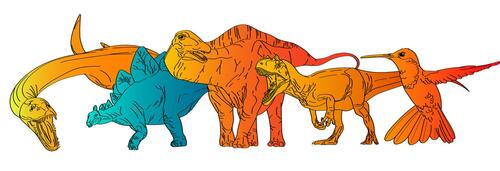
A Yale-led research team has turned up the heat on dinosaur metabolism — establishing that the earliest dinosaurs and pterosaurs had exceptionally high metabolic rates and were warm-blooded animals. The findings, published May 25 in the journal Nature, also show that dinosaurs’ metabolism did not decide their fate after an asteroid strike wiped out most animal species on the planet 65 million years ago. “The interactions of animals and the role they play in an ecological community is reflected in their metabolic rate,” said senior author Derek Briggs, the G. Evelyn Hutchinson Professor of Earth and Planetary Sciences in the Yale Faculty of Arts and Sciences and YIBS affiliated Faculty member. Co-authors include additional YIBS affiliated Faculty members, Jacques Gauthier and Pincelli Hull. The research was funded, in part, by grants from the Yale Institute for Biospheric Studies (YIBS) and the Geological Society of America. For more information, please click here for an article published by Yale News.



